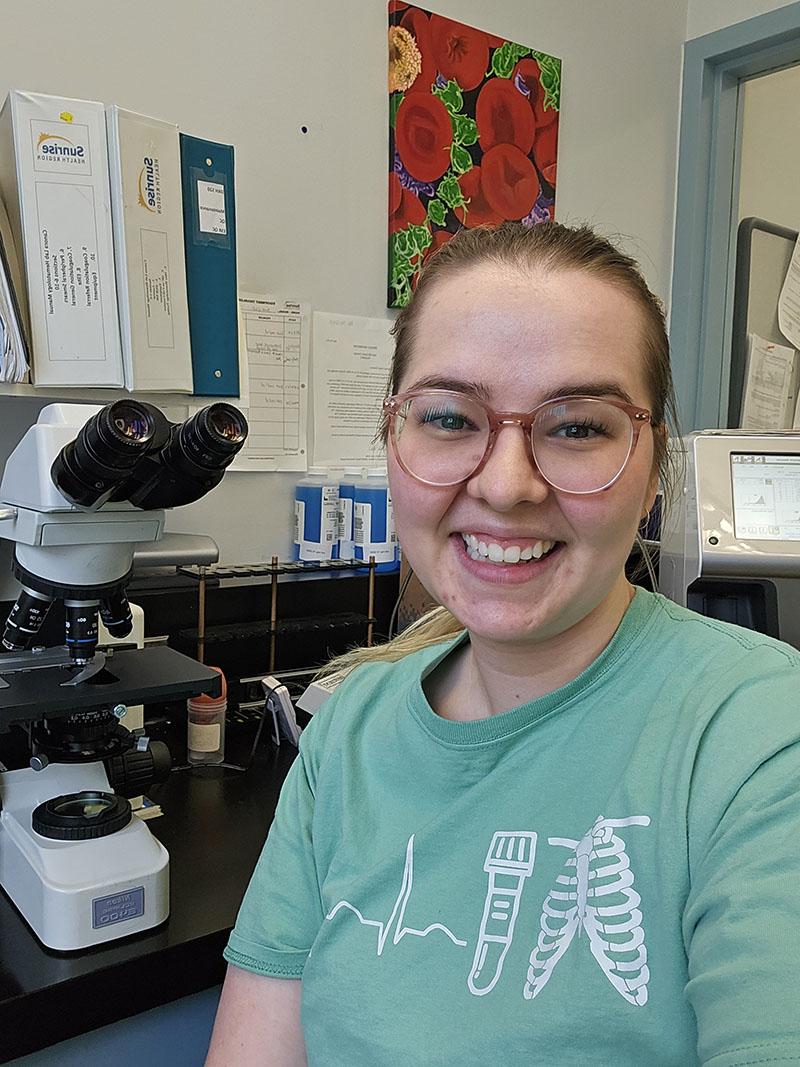Lyndsay Stang Career Spotlight
Lyndsay Stang is a Combined Laboratory and X-Ray Technologist (CLXT) who provides lab and imaging services in Canora, Saskatchewan.
What are you responsible for as a Combined Laboratory X-Ray Technologist? Please describe a typical day for yourself.
"From the lab side, as a CLXT working in a rural site, we are responsible for collecting blood from patients and instructing patients how to collect urine or stool samples. Some days we have to go to collect at Long Term Care centres if they are not connected to a hospital or smaller outlying rural collection sites, or even an occasionally home visit. There’s a lot of computer work to ensure all samples are properly tracked and entered and going to the correct doctors and sites for testing. Then we test the blood or urine on one of our many lab analyzers or prepare it to be shipped to one of the bigger labs in the city. Working in the lab, we have to make sure our lab analyzers are always running in the best condition so we are always spending part of our day running quality control tests, comparisons, crossovers, and calibrating to ensure your doctor is getting the most accurate results. The x-ray side is responsible for performing x-rays and ECG (electrocardiograms) and holter monitors. And then we always have to make sure we are staying up to date on our education and newest changes and updates."
How is your work-life balance as a CLXT? Please compare your current experience with other jobs you have had in the past.
"Work-life balance is definitely a learning curve for a CLXT, we do a lot of on call shifts, meaning after our shift we get to go home, but if an emergency comes in during the evening or overnight we’ll get called to come back into work for that patient. It can be tricky to navigate but it also gives you the benefit of overtime pay or banking the time for time off later."
Have you always wanted to be a CLXT? Tell us more about your career path!
"I wanted to be health-care for a very long time, but I don’t think I truly realized all the different professionals in health-care! I had a sick family member and nobody could figure out what was wrong or how to help and I just fell in love with the idea of being involved in that missing piece that provides that window inside a person so we can find out what’s happening and how to help people get better. I grew up in a small town and I was lucky enough to do a job shadow for a week where I shadowed an amazing tech and was able to find out more about how CLXTs differ from separate lab techs and diagnostic imaging techs."
Are there opportunities to further your career as a CLXT?
"While there are CLXT jobs like working supervisors or the lab computer program admins, there are really exciting opportunities to do CLXT jobs on the side or in your free time. I personally worked for a travel nurse agency for a while, where I got to travel all over and work in different labs and make a bunch of connections with people I get to run into now at courses and stuff. I got to use different kinds of lab analyzers and x-ray machines and that actually lead me to my current position. There’s provincial and national CLXT boards that are always planning conferences for us and advocating for CLXTs to be more widely recognized across the country. I’ve had friends who have worked side jobs for insurance companies or job sites where they go out in the field and do things like drug testing or medicals right on site for companies. There are many opportunities working as a CLXT!"
Do you have any advice for students or new graduates looking to pursue a career as a CLXT? Are there specialty areas that are in more demand than others?
"Students it’s not going to be easy but it’s going to be so so worth it and you can absolutely do it. When you’re done you’ll be so employable, and there’s jobs everywhere! CLXT's are needed primarily in rural and northern communities in Saskatchewan so if you love smaller towns this is a great career for you!"
What is the number one thing you love about being a CLXT?
"I love the variety. Working in a rural site, I get hands on patient care and get to build a relationship with the patients, but I also get to be behind the scenes doing the testing and reporting. I get to work along site so many other healthcare professionals and get to know the people I’m working alongside. I get basic routine laid back cases, I get crazy traumas. I love how every day, every call, is something different and I get to be a part of all of it."



